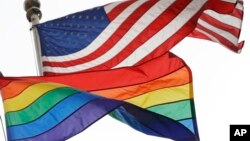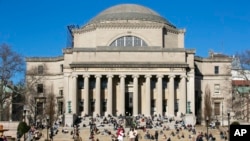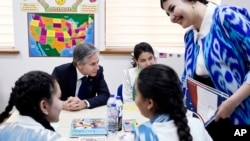Student Union
Alcohol Banned at 66 US College Fraternities

Alcohol will be banned at many fraternities on the campuses of U.S. colleges and universities, according to the national association that sets policy for those organizations.
The North American Interfraternity Conference approved a resolution last week saying its 66-member fraternities must "adopt and implement a policy by September 1, 2019, that prohibits the presence of alcohol products above 15 percent [alcohol by volume] in any chapter facility or at any chapter event, except when served by a licensed third-party vendor," according to a press statement.
Most hard liquor such as vodka, scotch, whiskey, tequila and rum have an alcohol content above 15 percent. Beer and wine typically have an alcohol content lower than 15 percent alcohol.
Drinking has increasingly become an issue on college campuses in the U.S. Several drinking-related deaths have occurred, usually in a student's freshman, or first, year and often when going through rituals to be accepted in fraternities.
Some schools offer "dry" dorms for students who don't want alcohol consumed in their living spaces. Others have created fraternities that bring non-drinkers together, such as Muslim fraternities.
One study revealed that some college students skip meals so they can consume those calories by drinking alcohol later in the day and avoid weight gain.
The ban will cover all areas of a fraternity house, including common rooms and bedrooms.
Emergency room physician Louis Profeta blogs about the perils of extreme drinking.
He described a dorm room where the smell of feces and urine filled the air, and how a roommate tripped over his fraternity brother lying dead on the floor after a night of five vodka slammers, one after another.
"Dead, waxy, with rock-still, clouded eyes ... you could never envision a stare so distant," Profeta writes in his blog. "You played pickup basketball yesterday at the campus rec center and … now, he is so still, laying among the pile of yet-to-be-washed clothes or wrapped up in a blanket on a [urine]-soaked IKEA futon delivered to him last week."
Profeta sees students coming through the emergency department of Saint Vincent's Medical Center in Indianapolis too often, he said. He understands the agony parents feel when their child's life is in peril.
"We're the ones who have to tell the parents how these kids die," Profeta said.
Click here to listen to a podcast about alcohol use on college campuses.
See all News Updates of the Day
- By VOA News
Michigan State international students get their own space

Michigan State University in East Lansing, Michigan, is setting aside a space in the International Center for international students.
Nidal Dajani, vice president of the school's International Student Association, said that the club plans to use the space to host events and hopes to collaborate with other student groups.
- By Dylan Ebs
International students find community during Pride Month

For LGBTQ+ international students, Pride Month, observed in June, is a unique time to reflect.
They hold on to multiple identities — both their LGBTQ+ identity and their cultural background — but coming to terms with them is not always easy.
For graduate student David Zhou, these identities can feel conflicting as transgender rights in China remain a controversial issue and spaces for LGBTQ people close. Zhou, 25, is transgender and pursuing an education in the STEM field at an urban university in the Midwestern United States.
VOA is using a pseudonym for Zhou’s first name and is not naming his university to protect his identity due to safety concerns back home in China. Zhou is not open about his transgender identity to his family.
During Pride Month, Zhou said he attended multiple LGBTQ+ events in his community and is surrounded by a supportive group of LGBTQ+ students who can relate to his experiences. But he’s not open about his identity to everyone on campus and said he doesn’t disclose his preferred pronouns to everyone to avoid transphobic comments.
“I feel like I have to make some judgments of the character of that person to see if they’re a good person to disclose [my identity] to,” Zhou said.
Zhou’s Pride Month celebrations included attending local markets with LGBTQ+ vendors and hanging out with his LGBTQ+ friends.
“They normalized being trans and for a long time I feel like trans identity is, should I say a vulnerability, brings me fear and worrying about discrimination, but having those events are helpful because it allowed me to see that queer people could just [live] openly,” he said.
At social events where few international students are present, Zhou said it can be tough to fit in.
“There's a lot of times like when they were talking about things I kind of, don't really understand, mostly because I kind of lack some background experience or knowledge,” he said.
Zhou said he is not aware of specific groups for LGBTQ+ international students at his university, but said international students are more prevalent in graduate programs and therefore find representation in organizations for LGBTQ+ graduate students.
In China, transgender individuals must obtain consent from an “immediate family member,” even for adults hoping to transition, which critics say limits the autonomy of transgender individuals while supporters say the policy protects doctors from violence by upset parents.
Struby Struble, a former coordinator of the University of Missouri LGBTQ+ Resource Center, told NAFSA: Association of International Educators in 2015 that LGBTQ+ international students face a “double barrier” on campus.
“With their international student friends, they feel isolated because they’re the LGBT one,” she said. “But then among the LGBT students on campus, they feel isolated because they’re the international one.”
Nick Martin, associate director of the Q Center, Binghamton University’s LGBTQ+ student support office, said when international students tour the center, there’s often a sense of hesitation as they enter a type of space that may not be present in their home country.
“I compare that to a year in after they've come into the space, they've again, maybe come to some of our events, they've got more connected,” he said.
Martin said graduate students have a unique interest in the Q Center as they may use the office for research and advocacy purposes that align with their studies.
“For older students, there may be hesitancy in a different way, but I think it's more in the vein of they want to do some of the advocacy work,” he said.
Martin said he thinks about how both his office and BU’s international student office can support students who come from countries with few — if any — protections for LGBTQ+ individuals.
“It's been a learning process of what those students really need, but I think I've kind of learned that a lot of students are just looking for the safe space that we offer,” Martin said.
- By VOA News
International students discuss US campus culture shock

International students at De Anza College in Cupertino, California, talked about culture shock in an article in La Voz News, the student newspaper.
"It felt like a major culture shock. Everything was so different, from academics to mannerism," said a student from Mexico.
Read the full story here.
These are the most expensive schools in the US

High tuition costs along with housing and food expenses can add up for students at U.S. colleges and universities.
MSNBC looked at the most expensive schools in the country, with one costing more than $500,000 for a bachelor’s degree. (June 2024)
Uzbekistan students admitted into top US universities

Students from Uzbekistan are among the international students admitted to top colleges and universities in recent years.
Gazata.uz profiled some of the Uzbekistan students attending Harvard, Brown, Princeton and other U.S. universities. (June 2024)






